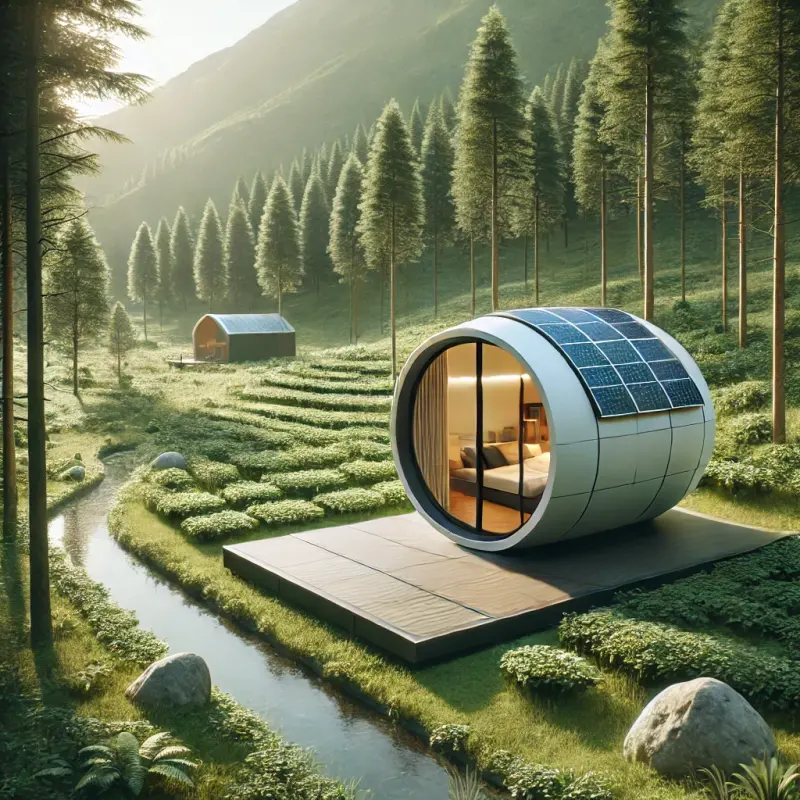Smart Gadgets for Autonomous Eco-Capsules: How Technology Enables Off-Grid Living
In a world where sustainability and autonomy are becoming increasingly important, eco-capsules present a fascinating solution for off-grid living. These small, self-sustaining homes are designed to operate independently of traditional infrastructure, relying on natural resources and smart technologies to provide modern comforts while minimizing environmental impact.
But what makes these futuristic dwellings possible? The answer lies in the sophisticated technologies embedded within these eco-capsules. From energy management systems to water conservation devices, smart gadgets play a crucial role in making off-grid living not only feasible but highly efficient. In this article, we’ll explore how technology supports the operation of eco-capsules and allows individuals to live comfortably without being connected to centralized utilities.

Smart Energy Management Systems
One of the most critical aspects of autonomous living is energy independence. Eco-capsules are often equipped with renewable energy systems, primarily solar panels, that harness energy from the sun. However, it’s not just about collecting energy; it's about using it efficiently. Smart energy management systems monitor energy usage in real time, ensuring that consumption aligns with available resources.
These systems are designed to optimize energy storage and distribution. For example, when solar energy production is at its peak during the day, excess power can be stored in advanced batteries. At night, these stored reserves provide the necessary power for lighting, appliances, and climate control. Modern smart home hubs can even prioritize certain devices based on energy availability, ensuring essential systems like heating or refrigeration always have power when needed.
Additionally, integrating energy-efficient appliances and lighting solutions reduces overall consumption, extending the operational capacity of the eco-capsule without sacrificing comfort.
Water Collection and Filtration
Water is another essential resource that eco-capsules must manage independently. Smart water collection systems, such as rainwater harvesting, allow these homes to capture and store water directly from natural sources. However, collecting water is only the first step; it must be processed and purified for human consumption.
This is where smart filtration systems come into play. Modern eco-capsules are often equipped with advanced water purification technology that can filter collected rainwater and convert it into drinkable water. Some systems even monitor water quality in real time, adjusting filtration levels to ensure optimal purity.
Water usage within the home is also optimized using smart plumbing systems. Low-flow faucets, smart showers, and toilets help reduce water consumption by using only the amount needed. These systems often come with monitoring apps, enabling users to track water usage and make adjustments to further conserve this precious resource.
Smart Climate Control
Living off-grid often means dealing with varying weather conditions. To maintain a comfortable living environment, eco-capsules rely on smart climate control systems. These gadgets monitor the internal and external temperatures and adjust heating or cooling systems accordingly.
For example, smart thermostats can be programmed to reduce heating when the eco-capsule is unoccupied or increase ventilation when the internal temperature rises. By optimizing temperature control, eco-capsules ensure energy is used efficiently, preventing unnecessary consumption while maintaining comfort. Many of these systems can be controlled remotely via smartphones, offering flexibility even when the occupants are away.
Waste Management and Recycling
Autonomous living also requires an efficient waste management system. Many eco-capsules are equipped with composting toilets and smart waste processing units. These systems break down organic waste safely, reducing environmental impact while producing usable compost for gardening or landscaping around the eco-capsule.
Additionally, some smart waste management systems can help sort and compact recyclables, making it easier to transport waste when necessary. By integrating these technologies, eco-capsules ensure that waste is managed sustainably without depending on municipal services.
Connectivity and Automation
Even in an off-grid setup, staying connected to the outside world is often a priority. Thanks to advances in satellite internet and smart communication devices, eco-capsules can maintain reliable connectivity even in remote areas. These systems allow residents to monitor their capsule’s systems, control smart devices, and access the internet for work or entertainment, all while living in harmony with nature.
Moreover, smart home automation systems further enhance the functionality of eco-capsules. These systems allow for seamless integration of various gadgets, enabling users to control lighting, climate, security, and energy usage from a single interface. This level of control is essential for optimizing the operation of an off-grid home, ensuring that all systems work in sync to minimize resource consumption and maximize comfort.
Conclusion
The dream of living off-grid in an autonomous eco-capsule is becoming more accessible thanks to advances in smart technology. From energy management to water filtration and waste processing, smart gadgets enable these small homes to operate independently while offering the comforts of modern life. As technology continues to evolve, eco-capsules will likely become even more efficient and sustainable, making them a viable solution for those seeking an eco-friendly, self-sufficient lifestyle.
The integration of renewable energy, smart water systems, and automation demonstrates that technology is not just a tool for convenience—it is a vital component in building a more sustainable future. By adopting these innovations, eco-capsules allow us to live in harmony with nature while minimizing our impact on the planet.
Artykuły
Dołącz do listy powiadomień, aby zawsze mieć dostęp do najnowszych i najbardziej interesujących artykułów w swojej skrzynce!